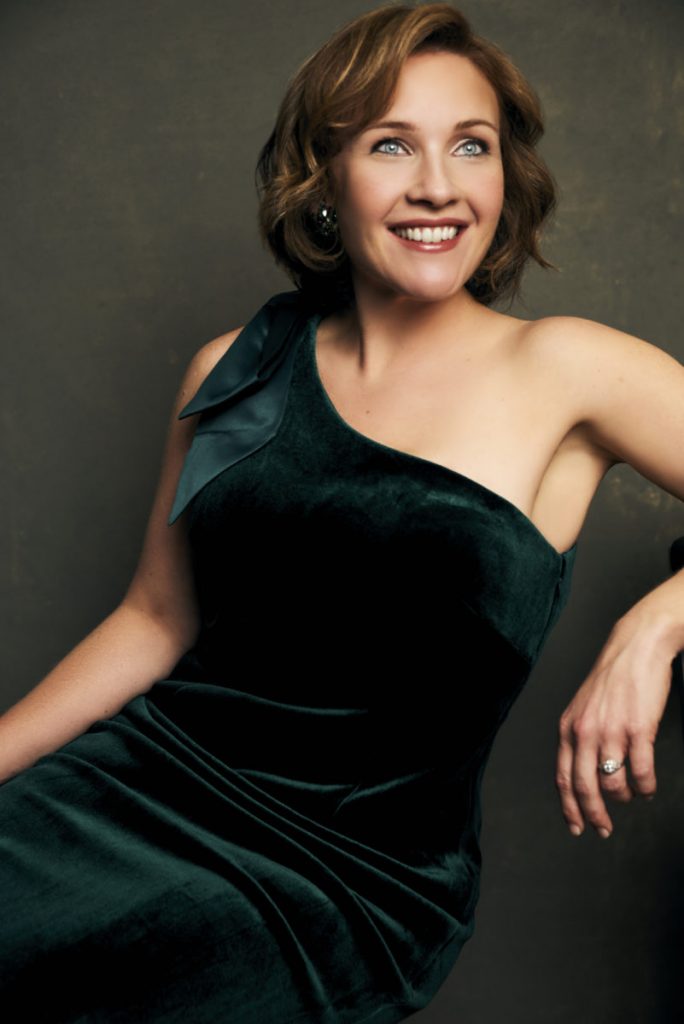Sasha Cooke brings artistic depth to melancholy Schumann for Vocal Arts

When Sasha Cooke came on the performance scene over a decade ago, she made big waves and the American mezzo-soprano’s voice has grown even more extraordinary in the years since.
Cooke returned to Washington Monday evening when Vocal Arts DC presented her third recital on their series, to a warmly appreciative crowd in the Kennedy Center Terrace Theater.
The program consisted of two varied song cycles by Robert Schumann, Frauenliebe und Leben and Zwölf Gedichte von Justinus Kerner. These substantial pieces bookended Beethoven’s mini-cycle An die ferne Geliebte, a major influence on Schumann’s work as a composer.
Cooke’s satiny voice has broadened, just as her sense of musical phrasing has deepened. This rendition of Frauenliebe felt far advanced over the last time she sang it in Washington, in 2008. Julius Drake, her partner in this outing, seemed to encourage Cooke’s savoring of text and rubato. The womanly warmth of her tone, as she and Drake took their time over each phrase, added to the feeling that the first song is an act of memory.
From there Cooke seemed to go back in time in the next three songs—to the wife’s memories of her young days, moving to the flush of youth and the breathless excitement of first love. The fourth song, “Du Ring an meinem Finger,” turned slow and tender as she admires her engagement ring, with Drake paying attention to the curling details of inner lines of the piano part.
With subtle gestures and facial expressions, Cooke made clear that she understood the meaning of each word she sang. The approach was achingly sincere, even though the slavish devotion of the young wife to her husband, as conceived by a poet and composer who were both men, often grates on women today. At times the top notes, when not floated but sung with force, seemed uncertain, as on the attacks of high notes in “Süsser Freund, du blickest.”
A theme from the last song of Beethoven’s An die ferne Geliebte became a touchstone for Robert and Clara Schumann. The former quoted or alluded to it in a number of his pieces, including one of the Frauenliebe songs. It is generally thought of as a male cycle, but it beautifully suited the strengths of Cooke’s voice. At one point in “Wo die Berge so blau,” the vocal part proceeds meditatively on a single note, while the piano takes the tune.
Drake excelled in the greater challenges of the Beethoven, creating a murmuring accompaniment in “Leichte Segler” and whispered blue-note bird-call trills in “Es kehret der Maien.” In a sense Cooke’s rendition of the final song in this set, “Nimm sie hin denn,” steeped in nostalgic ardor, lined up dramatically with the opening song of Frauenliebe.
Schumann’s set of Justinus Kerner songs can be a hard sell, with a generally darker vocal tone and polyphonically complex piano part. Cooke and Drake gave a lovely rendition, bringing together the different perspectives, alternately bold and somber. Singers tend to avoid the set because the range changes from song to song: Schumann acknowledged he had more than one voice in mind, indicating that different songs may be preferable for tenor, others for baritone.
The high notes again proved treacherous, in “Sehnsucht nach der Waldgegend” and in the sweeping crescendo line of “Stille Tränen.” Drake, even with the piano lid on the half-peg, pushed the volume too far and engulfing his soloist. In more delicate songs, like “Erstes Grün,” the combination of Cooke’s poised phrasing and Drake’s subtle touch were ideal. In the set’s last two songs, there are no pyrotechnics or high drama to hold the listener’s interest, but the contained and artful sadness of both stood out in this performance.
Schumann remained the focus in two encores. “Ins Freie,” one of the six songs on poetry of Wilfried von der Neun, was an ecstatic expression of freedom. “Des Sennen Abschied” from Schumann’s Lieder-Album für die Jugend followed, here a wistful expression of farewell to the joys of summer. The two poles of love, idolization and regret, seemed wholly contained in them.
Vocal Arts DC presents bass-baritone Davóne Tines and pianist Adam Nielsen 7:30 p.m. March 30, in a program featuring world premieres by Caroline Shaw and Tyshawn Sorey. vocalartsdc.org

Posted Feb 18, 2020 at 12:54 pm by Peggy McNulty
A wonderful concert and this review is excellent and “right on.”
Thank you